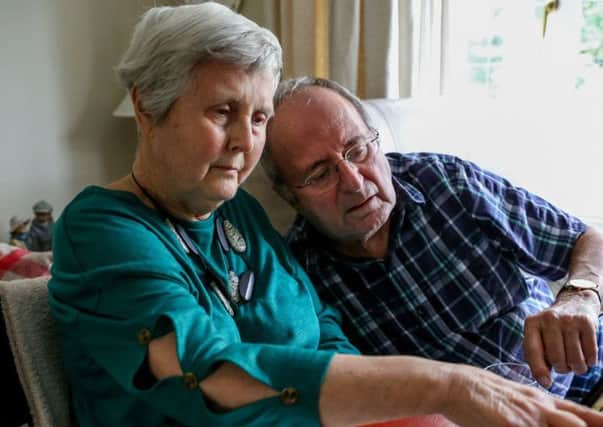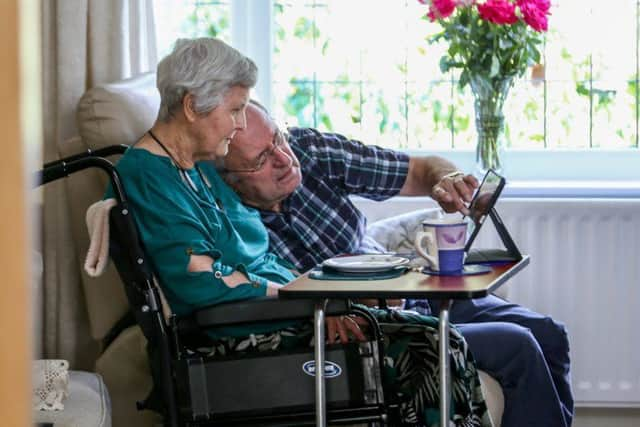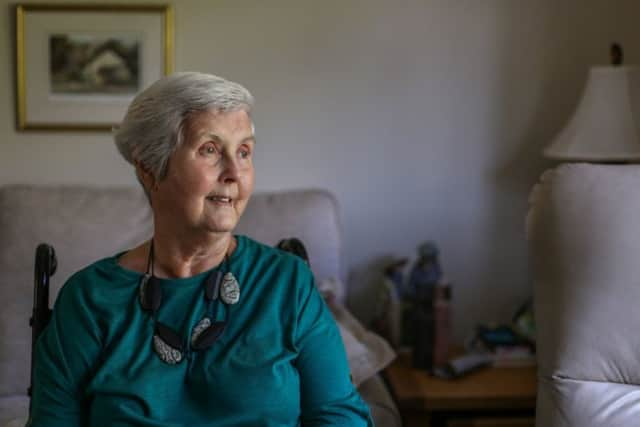Coping with stroke at Christmas


Stuart Atkin, 75 from Bradford, and his wife Pamela will be spending their first Christmas together since Pam had a life changing stroke on New Year’s Day 2019,
Pamela spent a total of 50 days in hospital, initially in intensive care before being moved to the stroke ward at Bradford Royal Infirmary. Pamela’s stroke left her with left-sided weakness and affected her cognition.
Advertisement
Hide AdAdvertisement
Hide Ad“As Pam’s stroke was on New Year’s Day 2019 this will be our first Christmas experience in our new situation. Had it been just a few months after her stroke I would have not wanted to bother with Christmas at all,” says Stuart..


“Pam was usually the one to worry about Christmas, cards, presents and decorations, while I tended not to get involved until December started.
“Pam spent time shopping with members of the family, while I tended to do all my shopping online. The stroke has changed all that.
“We won’t be entertaining at home this time apart from having family in for drinks or a takeaway. We’ll be spending Christmas Day at our son’s in Otley, although it will be probably for a few hours and leaving early evening to get back home. I’m not sure how relaxing it will be although Pam will love it.
Advertisement
Hide AdAdvertisement
Hide Ad“We’ve decided to give money rather than presents in the main, it’s an easier option.


“We were thinking about not sending the 80 or so Christmas cards and giving to charity but decided it would be good therapy for Pam to write them. We’re buying cards that give a donation to the Stroke Association.
“I think the main difference is having to arrange things for brief visits. We always went out with friends to Christmas dinner at various restaurants, whereas this year we have asked them to arrange for lunchtime meals or early evening because we just cannot face busy places.
“On one hand we will look forward to the Christmas atmosphere, as a change to our routine, but not sure how we will feel about our restricted situation.
Advertisement
Hide AdAdvertisement
Hide Ad“Earlier in the year I wouldn’t have wanted the extra effort as I would probably been reflecting on what it we used to do, but now I’m more able to accept our changed circumstances.
“My only issue is what Pam’s expectations will be as I can take it or leave it as I have enough on my plate. I have asked Pam what she thinks will be different.
“She said she won’t be able to do anything this year, but doesn’t seem to be stressed.”
Opening Christmas presents is the favourite Christmas activity for people living in Yorkshire according to a new survey by the Stroke Association.
Advertisement
Hide AdAdvertisement
Hide AdThe charity has found that the region’s favourite activities at Christmas time also include wishing people Merry Christmas and decorating the tree.
Yet many of the UK’s 1.2 million stroke survivors are no longer able to enjoy these and many other Christmas pleasures.
For well over a third of stroke survivors, the effects of their stroke will mean that this Christmas they will be unable to play with the children or grandchildren, decorate the tree, and cook or help to cook the Christmas dinner.
One in five stroke survivors won’t even be able to wish their friends and loved ones a “Merry Christmas” due to problems with their communication.
Advertisement
Hide AdAdvertisement
Hide AdKate Charles, the Regional Director at the Stroke Association, said: “Christmas is a special time to enjoy with family and friends, but for thousands of people stroke will have had turned their lives upside down.
“That’s because stroke happens in the brain, the control centre of who we are and what we can do. The impact varies depending on which part of the brain is affected.
“It could be anything from wiping out your speech and physical abilities, to affecting your emotions and personality.
“The Stroke Association helps people to rebuild their lives after stroke, but we cannot do this without your support.
Advertisement
Hide AdAdvertisement
Hide Ad“This Christmas we want to highlight the challenges that stroke survivors face as they struggle to take part in the activities we cherish the most, from putting the Christmas Fairy on top of the tree to cooking Christmas Dinner or playing with their children and grandchildren.
“For those survivors whose stroke has left them with speech and communication difficulties, even the simple pleasure of wishing someone a Merry Christmas has been taken away.